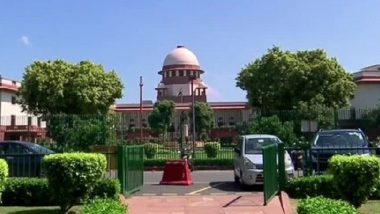New Delhi, March 6: The Supreme Court has said merely breaching a contract cannot lead to initiation of criminal prosecution for cheating unless fraudulent intention is shown at the beginning of the transaction even as it stressed that the criminal courts are not meant to be used for settling scores or to pressurise parties to settle civil disputes.
A bench of Justices Abhay S. Oka and Rajesh Bindal said: "A breach of contract does not give rise to criminal prosecution for cheating unless fraudulent or dishonest intention is shown right at the beginning of the transaction. Merely on the allegation of failure to keep up promise will not be enough to initiate criminal proceedings." Supreme Court Terminates Mandate of Committee of Administrators To Manage Affairs of All India Football Federation.
The bench observed that the entire idea seems to be to convert a civil dispute into criminal and put pressure on the appellant for return of the amount allegedly paid. "The criminal courts are not meant to be used for settling scores or pressurise parties to settle civil disputes. Wherever ingredients of criminal offences are made out, criminal courts have to take cognisance," it added. Supreme Court Orders Release of Death Row Convict Found To Be Juvenile at the Time of Crime.
The apex court made these observations while setting aside a Punjab and Haryana Court order, declining to quash an FIR against a petitioner under Sections 420 (cheating), 120 B (criminal conspiracy) and 506 (criminal intimidation) of the IPC. The top court was hearing a plea filed by Sarabjit Kaur challenging the high court order and the matter was connected with the sale of land.
The petitioner had entered into an agreement to purchase a plot of land in May 2013 with Malkit Kaur, wife of Surender Singh. Later, she entered into another agreement to sell the same land to the wife of Darshan Singh. The petitioner received Rs 5 lakh and later another Rs 75,000. Darshan Singh filed a complaint against property dealers Manmohan Singh and Ranjit Singh, as the agreement was not executed. In 2016, it was held that it was a civil dispute and no police action was required. Without disclosing this complaint, Darshan Singh lodged an FIR against the petitioner and the property dealers.
The top court said: "From the facts available on record, it is evident that the respondent No.2 (Darshan Singh) had improved his case ever since the first complaint was filed in which there were no allegations against the appellant and rather it was only against the property dealers which was in subsequent complaints that the name of the appellant was mentioned."
"The complaint in question on the basis of which an FIR was registered was filed nearly three years after the last date fixed for registration of the sale deed. Allowing the proceedings to continue would be an abuse of process of the court."
In conclusion, the apex court said: "Hence, in our opinion, the impugned order passed by the high court deserves to be set aside. The petition filed by the appellant for quashing of FIR is ordered to be allowed. As a consequence, FIR No 430 dated October 16, 2017 and all the subsequent proceedings therewith are ordered to be quashed. The appeal is, accordingly, allowed."
(The above story first appeared on LatestLY on Mar 06, 2023 09:20 PM IST. For more news and updates on politics, world, sports, entertainment and lifestyle, log on to our website latestly.com).













 Quickly
Quickly




















